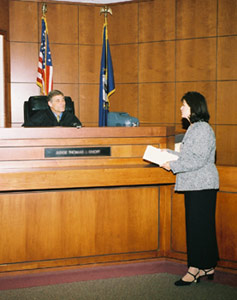
CITIZENS FOR BETTER
JUDGES: AN EFFECTIVE EFFORT
TO INFORM AND IMPROVE JUDICIAL SELECTION
By: Daniel T. Goyette
for publication in the 1991-92 edition of The Kentucky Journal
(Kentucky Center for Public Issues)]
History of Citizens For Better Judges
With
the passage of the Judicial Article on November 4, 1975, Kentucky’s
court system underwent extensive reform and modernization. The
many changes included the construction of a unified, centralized
court system with exclusive judicial power vested in one Court
of Justice consisting of four tiers, to wit: a Supreme Court,
a Court of Appeals, a Circuit Court of general trial jurisdiction
and a District Court of limited trial jurisdiction. Of these courts,
the District Court had perhaps the most immediate and far-reaching
impact on the court system in that, as the lowest and often entry
level point in the system, it is the court with which the public
has most contact and the one which replaced and absorbed the then
existing hodgepodge of Quarterly, Police, Magistrate, Probate,
Traffic and Juvenile courts. |
In
Jefferson County, this translated into the creation of 23 district
court judgeships and, combined with the concomitant merger of
the circuit court chancery, common pleas and criminal branches
into 16 divisions of Jefferson Circuit Court, a total of 39 judicial
positions which needed to be filled on a regular and continuing
basis. At the same time, in order to increase the professionalism
and independence of the judiciary, the Judicial Article required
judges filling these positions to serve full-time and prohibited
them from running for other elective offices as well as from holding
positions in a political party or organization. However, despite
the numerous innovations and reforms contained in the Judicial
Article, it failed to fundamentally change what many consider
to be an unreliable and unsound judicial election process in Kentucky.
While the Judicial Article included features of merit selection
in filling vacancies on the bench between elections, the ultimate
method for judicial selection in Kentucky remains popular election,
albeit in non-partisan races. This continues to be the case notwithstanding
the growing trend toward merit selection and appointive systems
designed to counteract the soaring costs and potential conflicts
in judicial elections which threaten the quality, integrity and
independence of the judiciary. |
 |
Confronted
with a less than effective selection method for ensuring a competent,
well-qualified judiciary, and given a substantially enlarged number
of judicial seats up for election, a group of bar leaders sponsored
a public meeting in January, 1983 to discuss uniting Louisville’s
lawyers in a campaign to elect the most qualified judicial candidates.
From that meeting emerged an organization which eventually came
to be known as Citizens for Better Judges (“CBJ”).
Its stated purpose was and is a commitment to the proposition
that the public is entitled to a competent, conscientious and
professional judiciary. The members of the Citizens for Better
Judges agreed to dedicate their time, energy and financial resources
toward that purpose and make an effort to remove the financial
and organizational considerations that discourage legitimate candidates
from pursuing election to the bench. Additionally, CBJ resolved
to eliminate partisan politics, personal affiliation and vested
self-interest as factors in the election of the judiciary. |
 |
Structurally, the CBJ organization has three components: a 30-member Steering Committee made up of attorneys who concentrate in different fields of law but who, for the most part, engage in a litigation practice to some extent; a Citizens Review Board consisting of an equal number of community-minded citizens drawn from the ranks of business, labor, government, education, medicine, mental health, as well as other civic and religious leaders; and an Advisory Board comprised of past CBJ chairpersons and the current chairs of the steering committee and the review board. Diversity of membership is sought in all respects. Past and current members include University professors, the Jefferson County Police Chief, the Principal of Central High School, the President of the Jefferson County Medical Society, the President of the U of L Student Government, the President of the Chamber of Commerce and the Presidents of several local unions, businesses, banks, professional and non-profit organizations, among others. Over the years, there has been active and dedicated participation on the part of members of all components of Citizens for Better Judges, which has contributed significantly to the reputation, longevity and success of the organization. |
CBJ’s
work begins well in advance of the primary election. The Advisory
Board meets to identify candidates for vacancies on the bench,
develop an interview and endorsement schedule, and discuss fund-raising
and advertising. Thereafter, each candidate who files for judicial
office is invited to an interview with the members of CBJ. All
candidates who meet the group for an interview are assured that
any discussion that transpires during the course of the interview
will be held in the strictest of confidence. Similarly, within
the organization, members of both the Steering Committee and the
Citizens Review Board maintain confidentiality with respect to
comments made by members during the interview and, especially,
the endorsement process. Early on, confidentiality was recognized
as a most important ingredient in effectively achieving the organization’s
purpose and assuring fairness in the process to both the candidates
and the membership. Without it, the free and open discourse which
is essential to full deliberation becomes inhibited and the CBJ
membership’s best efforts to thoroughly examine and discuss
the qualifications of candidates are compromised. |
All interviews are of the same duration and focus on five major topic areas suggested as critical by the American Bar Association in its guidelines on the evaluation of candidates for judicial office. Those topics include: (1) personal attributes such as physical and mental health, family or financial problems which the candidate believes would affect his or her ability to preside impartially, reasons for seeking election or re-election, public service and civic involvement, etc.; (2) legal knowledge and ability including academic record, experience, professional achievements, continuing legal education, analytical approach, etc.; (3) court management skills such as supervisory and organizational abilities, work ethic, ideas about improvement of the judicial system, etc.; (4) judicial temperament relating to qualities such as fairness and impartiality in the conduct of proceedings, decisiveness, dignity, decorum, compassion, etc.; and (5) judicial integrity as reflected by adherence to the Code of Judicial Conduct, enforcement of the Rules of Professional Conduct with respect to attorneys appearing before him or her, uniformity of rulings, susceptibility to influence, ratings in the Louisville Bar Association’s Judicial Evaluation and Judicial Candidate Poll, etc. Throughout the interview, recognition is given to the fact that judicial candidates are bound by the Code of Judicial Conduct in their campaigns for election and every effort is made to avoid questions which would infringe on their ethical obligations. At the completion of each interview, the candidate is given an opportunity to summarize his or her qualifications and make a statement in support of his or her candidacy. |
 |
|
After all the interviews have been
completed, the CBJ membership meets to consider the information
obtained during the interviews, including (1) the candidate’s
resume; (2) a summary of the questions asked and answers given
at the interview; (3) personal observations and opinions of those
attending the interview; and (4) comments of members based upon
personal experience with the candidate which are relevant to his
or her qualifications. CBJ then follows a written endorsement
procedure which is incorporated into its bylaws. Basically, a
candidate must receive a favorable vote of three-quarters of the
Steering Committee who are present and voting, but not less than
ten favorable votes in order to be endorsed. Thereafter, the endorsement
of the Steering Committee is submitted to the Citizens Review
Board for approval. This approval is based upon the Citizens Review
Board’s determination that the interview process and endorsement
procedure was fully and fairly conducted by the Steering Committee
and the endorsement was made in accordance with CBJ’s bylaws.
If the Citizens Review Board does not approve an endorsement,
the matter is returned to the Steering Committee for further consideration
and appropriate action.
In some instances in the past, CBJ has been faced with races which included more than one qualified candidate and others which included no qualified candidates. In the former situation, CBJ adopted a policy that only one candidate would be endorsed based upon the rationale that the purpose of the organization was to recommend and support the best candidate for election and, if the organization was unable to make such a choice, it could not expect the electorate to do so. In the latter situation, precedent has been established for not making any endorsement in a race where CBJ determines that the candidates are unqualified and do not meet the high standards for endorsement. It was agreed that, to do otherwise, would compromise the credibility of the organization and defeat its announced purpose. Furthermore, it is hoped that such action sends a message to the candidates which will improve the performance of the individual who is ultimately elected or, in the alternative, encourage other qualified candidates to seek election to that position in the future. Impact
Of Citizens For Better Judges
In the thirty-one years of its existence, Citizens for Better Judges has conducted hundreds of judicial candidate interviews and invested thousands of hours in accomplishing its organizational purpose, namely to improve the judiciary by educating the voting public as to the best and most qualified candidates for judicial office. By all accounts, and by most any measure, it has been successful. While the traditional lack of interest in judicial elections reflected by low voter turnout may continue, there can be little doubt that Citizens for Better Judges has made a real difference. When the organization began its efforts, it was said that Jefferson Countians were in the habit of “electing whole families to the bench,” such was the power of incumbency and name recognition in judicial races. Several subsequent elections in which CBJ made endorsements contrary to this sort of modern-day Whiggery of inherited judicial seats indicate some break in this pattern due to CBJ’s work. Indeed, The Courier-Journal has referred to Citizens for Better Judges as “the major and most influential civic group interested in judicial elections,” and commended the organization for earning a reputation “for careful screening of candidates before making endorsements.” |
 |
Another
measure of success is the viewpoint of the candidates. With rare
exceptions, the candidates have actively sought support from CBJ
and virtually all of them have repeatedly stressed the importance
of the CBJ endorsement to their respective campaigns. In one early
judicial race which had a field of 22 candidates, the CBJ endorsed
candidate was a well-qualified but relatively unknown attorney
given little chance of being elected in his first judicial race.
To the surprise of all the political prognosticators, he finished
third in the primary, only 300 votes shy of going on to the general
election. In a letter written following the election, the endorsed
candidate attributed his strong showing almost entirely to the
CBJ endorsement. He subsequently sought election to another judicial
seat, again with CBJ’s endorsement, and was elected by a
substantial majority.
© 2016, Citizens For Better Judges - all rights reserved |